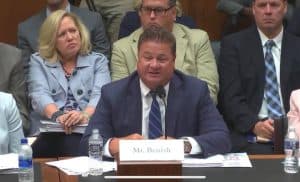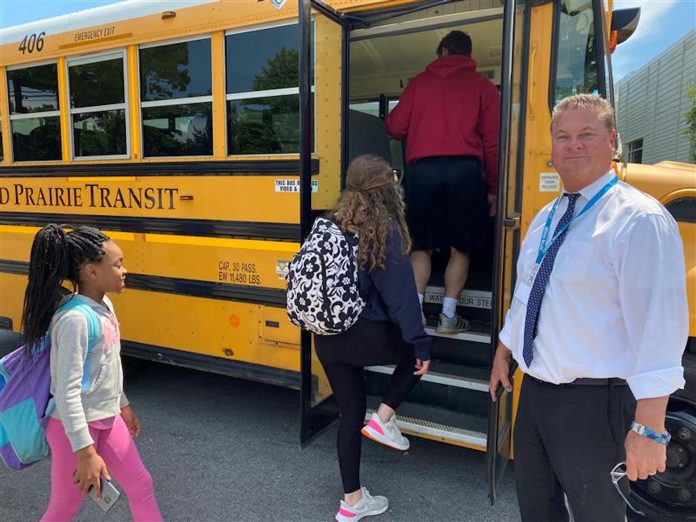In 1958, when my father, John Benish, Sr., began ferrying the rapidly expanding Chicago-area children to and from school, the Space Race had just begun, and Elvis Presley topped the charts. But long after Elvis had left the building—even in the 1990s—I remember the plume of black smoke that would rise above our iconic yellow school buses when the driver started the engine. Six decades later, a lot has changed! For one thing, our kids have cleaner buses to ride on – and in our company’s case, biodiesel is largely to thank.
In fact, we’re celebrating 25 million miles driven on biodiesel blends this year. That’s why I am urging all school bus fleets to take a serious look at adopting biodiesel to reduce their carbon footprint and clean up the air that students, drivers and the community breathe.
Today, Cook Illinois Corporation transports almost 100,000 children every day. I’m the second generation of my family to lead this company. My late father was always an innovator – in fact our company was one of the first to adopt automatic transmissions. When I wanted to introduce biodiesel in 2005, he was all for it. Twenty-five million gallons later, I’ve concluded that biodiesel is the fastest, easiest way to decarbonize a school bus and clear the air.
We use biodiesel blends, up to 20 percent, in pretty much everything with a diesel engine. For us that’s about 2,200 buses. It’s been very reliable. We would never use a fuel with any risk of breaking down for any reason. We must hit a window within five or 10 minutes every day, and follow that schedule year-round, even when the temperature hits zero degrees. As a for-profit company, any decision we make also has to make “dollars and cents.” That’s what I like about biodiesel – it’s cost-effective. We don’t have to change anything on the engine. Also, I can run biodiesel one day and diesel the next, if necessary.
At the heart of our commitment to biodiesel is that it is better for the children. Modern buses are cleaner than they’ve ever been, but now we have restrictions around the school and idling is not allowed. Biodiesel is going to reduce emissions, especially in older vehicles, and you don’t lose efficiency. We transport many special needs kids, and breathing issues and asthma are common. A new study shows that switching to 100 percent biodiesel in 28 transportation and home heating oil sectors, one of which was Chicago – Naperville, would create immediate community health improvements. Those would include more than 456,000 fewer/reduced asthma cases per year, more than 142,000 fewer sick days per year and over $7.5 billion in avoided health costs annually.
As if that weren’t enough, we also know that biodiesel is better for our engines – an added bonus! For many years, we’ve rebuilt our own engines and transmissions. Biodiesel replaced lubricity that was taken out from Ultra Low Sulfur Diesel – and the reduced wear and tear is clearly visible.
Related: New Data Indicates Biomass Diesel Reduces Carbon Intensity Better than Electric
Related: Selecting the Fuel that Makes Cents for You: Renewable Diesel
Related: Outdoor Immersive Green Technology Experience Caps Off Green Bus Summit
Related: Cleaner Energy, Fuel Infrastructure Considerations Shared During EPA Webinar
Related: Benish, Sr. Built Chicago School Bus Contractor Powerhouse
I also like the fact that biodiesel supports our state’s soybean farmers rather than feeding the foreign oil machine. Chicago is the pinnacle of our nation’s big cities, and most people think of skyscrapers, shopping and nightlife. But if you really look at it, Chicago is surrounded by something like one big farm field. Illinois is one of the largest soybean producers in the country. The meal from the soybeans feeds livestock, and the leftover soybean oil has typically had a lower demand. That’s why farmers originally had the idea to create the biodiesel industry. Although biodiesel can be made from any fat or vegetable oil, soybean oil is the number one material used in its production.
We wanted to do something better for the kids, better for the environment and something that helps out farmers – it’s a win for everyone. We do it by choice because we think it is the right thing to do.
I dare say my kids don’t think I’m cool all that often. But when I tell them about biodiesel – they think that’s cool. And so do I. But unlike the days of Elvis’s reign, cool will only get you so far. We recognize that there is much more at stake.
I serve as a “Bio Ambassador,” a volunteer mentoring program, and am proud to help anyone considering biodiesel to take that next step. It’s easy. It works. And it will lead us to a better place, as the industry charged with one of the most important jobs in the world.

John Benish, Jr., is president and chief operating officer of Cook-Illinois Corporation, the sixth largest school bus contractor in the U.S. He is past president of the National Student Transportation Association and an inaugural member of the B20 Club of Illinois, a partnership of the American Lung Association and Illinois Soybean Association.
















